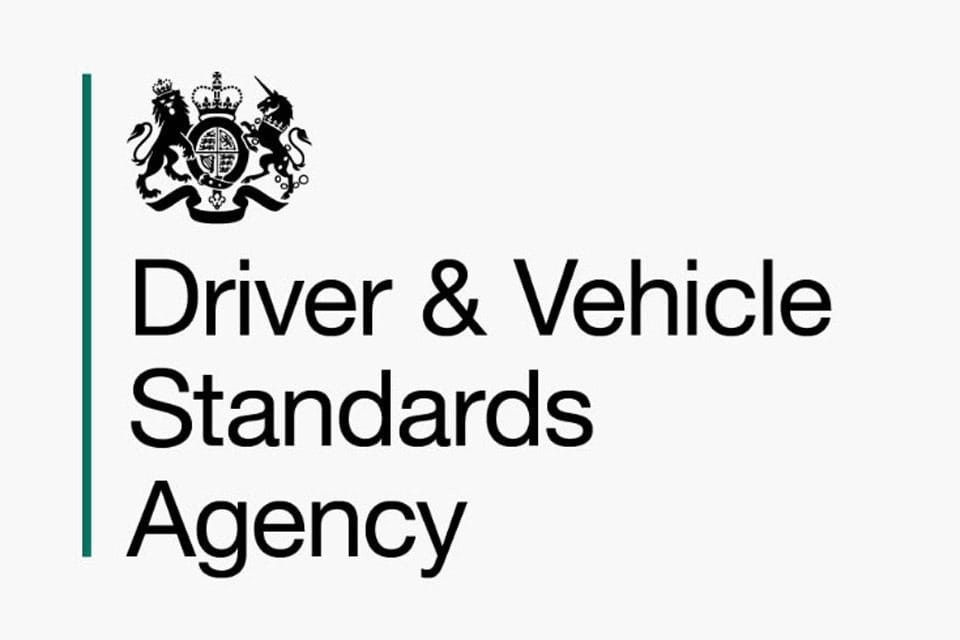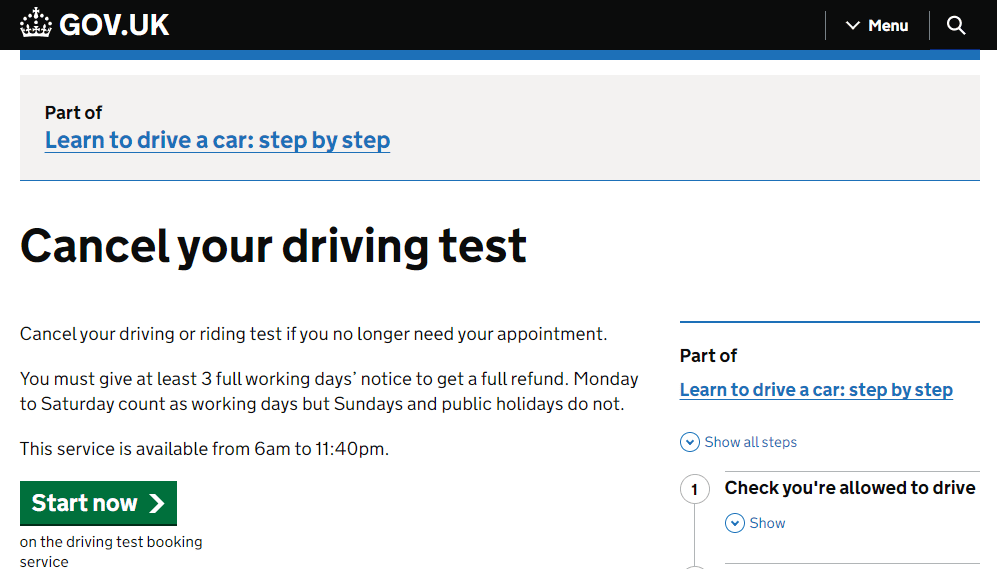
Learning to drive is a significant milestone for many individuals in the UK. For learner drivers, scheduling and passing the driving test is a crucial step towards gaining independence on the road.
However, sometimes circumstances arise that necessitate cancelling a driving test. This article delves into how many times you can cancel your driving test, what constitutes a cancellation, and the implications of doing so repeatedly.
Understanding Driving Test Cancellations
Cancelling a driving test can be a stressful decision, often influenced by various factors. It’s essential to understand the mechanics and implications of cancelling your test to avoid unnecessary complications.
What is a Driving Test Cancellation?
A driving test cancellation occurs when a learner driver decides to cancel a scheduled practical driving test appointment with the Driver and Vehicle Standards Agency (DVSA).

This can be done through the DVSA website, by phone (0300 200 1122), by email (customerservices@dvsa.gov.uk) or by post. A cancellation might be necessary for several reasons, which will be discussed later.
Importantly, cancelling is different from rescheduling, although both actions involve altering the original test appointment.
- When you cancel your test, you are effectively forfeiting your slot. Depending on when you cancel, you may or may not be eligible for a refund.
- Rescheduling, on the other hand, involves changing the date or time of your test while retaining your booking.
Reasons for Cancelling a Driving Test
There are numerous reasons why a learner driver might need to cancel their driving test. These reasons can range from personal circumstances to broader issues such as health or availability of resources.

Personal Circumstances:
- Health Issues: If the learner driver is unwell, it might be unsafe or impossible to take the test. The DVSA advises that you should be fit to drive, and any health issue that impairs your ability could warrant a cancellation.
- Family Emergencies: Unforeseen family emergencies might require immediate attention, leaving no room to attend the test.
- Work or School Commitments: Sometimes, unexpected work or school commitments can clash with the test schedule.
Preparation Concerns:
- Lack of Preparation: The learner driver might feel unprepared for the test and decide that cancelling is better than risking a failure.
- Instructor Availability: If the driving instructor is unavailable due to sickness or other commitments, the learner might choose to cancel.
External Factors:
- Weather Conditions: Severe weather conditions like heavy snow or fog can lead to cancellations as they pose safety risks.
- Administrative Errors: Sometimes, errors in scheduling or documentation might necessitate a cancellation.
Rules and Regulations for Cancelling
Understanding the rules and regulations set by the DVSA for cancelling a driving test is essential to avoid penalties and complications.
Notice Period:
The DVSA requires a minimum notice period of three clear working days to cancel or reschedule a driving test.
This means weekends and public holidays are not counted. For instance, if your test is on a Friday, you need to cancel by the preceding Tuesday at the latest.
Refund Eligibility:
If you cancel your driving test within the stipulated notice period, you are eligible for a full refund of the test fee. However, if you cancel after this period, you will not receive a refund.
Rescheduling vs Cancelling:
If you choose to reschedule rather than cancel, you still need to adhere to the three working days notice period.
Rescheduling within this period will not incur any additional fees, but doing so after the notice period will result in forfeiting the original test fee.
How many times you can change your appointment
You can change your appointment up to 6 times. If you need to make more changes after that, you have to cancel your test and rebook it.
Cancellation Limits and Policies
The DVSA has established specific guidelines regarding the cancellation of driving tests. It is crucial for learner drivers to be aware of these guidelines to manage their test schedules effectively.
Official DVSA Guidelines
The DVSA sets clear guidelines on how and when you can cancel your driving test. These guidelines ensure that both the learner drivers and the DVSA can manage their schedules efficiently.

- Minimum Notice Requirement: As mentioned, the minimum notice for cancelling or rescheduling is three working days.
- Cancellation Process: Cancellations can be made online through the DVSA website, by phone, or via post.
- Refund Policy: Full refunds are provided if cancellations are made within the required notice period.
- Health-Related Cancellations: If a cancellation is due to health reasons, the DVSA may consider waiving the notice period requirement if appropriate medical evidence is provided.
Maximum Number of Cancellations Allowed
While the DVSA does not explicitly state a maximum number of times a driving test can be cancelled, excessive cancellations can lead to scrutiny.
The primary concern is whether the learner driver is adequately prepared and serious about taking the test.
Informal Limits:
- Repeated Cancellations: Although there is no official cap, repeatedly cancelling tests might raise concerns with the DVSA. If a pattern of cancellations is observed, the DVSA may reach out to understand the reasons behind it.
- Instructor Advice: Driving instructors may also advise against repeated cancellations as it might indicate a lack of readiness or confidence, which can be detrimental to the learning process.
Impact of Multiple Cancellations on Your Test Record
Multiple cancellations can have several implications, both administratively and psychologically. Understanding these impacts can help learner drivers make informed decisions.
Administrative Implications:
- DVSA Scrutiny: As mentioned, the DVSA might monitor repeated cancellations to ensure there is no misuse of the booking system.
- Booking Delays: Frequently cancelling and rescheduling might result in longer waiting times for new test dates, as test slots are limited and in high demand.
Psychological Impact:
- Confidence Levels: Repeated cancellations can affect a learner driver’s confidence. Constantly delaying the test might reinforce doubts about their readiness and ability.
- Learning Progress: Cancelling too often might interrupt the learning process. Regular practice and a timely test date are crucial for retaining skills and building confidence.
Financial Considerations:
- Cost Implications: Each cancellation after the notice period results in the loss of the test fee. Repeated cancellations can thus become financially burdensome.
- Instructor Fees: Learners often book extra lessons closer to their test dates. Cancelling the test might mean paying for additional lessons to stay prepared, leading to increased costs.
How to Cancel Your Driving Test
Cancelling your driving test can be a straightforward process if you follow the correct procedures. The DVSA offers several methods to cancel your test, ensuring that learner drivers can choose the most convenient option.
Online Cancellation Process
The online cancellation process is the most convenient and commonly used method. Here’s how you can cancel your driving test online:
- Visit the DVSA Website: Go to the official DVSA website and navigate to the section for managing your driving test.
- Log In: You will need to log in using your driving licence number and booking reference number.
- Select ‘Cancel Test’: Once logged in, find your scheduled test and select the option to cancel it.
- Confirm Cancellation: Follow the prompts to confirm your cancellation. You will receive a confirmation email once the process is complete.

Image: Cancel your driving test (DVSA website)
Cancelling by Phone
If you prefer, you can also cancel your driving test by phone. This method might be more suitable if you have any queries or need assistance with the process.
- Call the DVSA: Use the DVSA customer service number (0300 200 1122) to reach an agent.
- Provide Details: Be ready to provide your driving licence number and booking reference number.
- Request Cancellation: Inform the agent that you wish to cancel your test. They will guide you through the process.
- Receive Confirmation: The agent will confirm your cancellation, and you should receive a follow-up email.
Key Points:
- Ensure you call within the DVSA operating hours. (Monday to Friday, 8am to 4pm)
- Have all necessary information at hand to avoid delays.
Important Deadlines and Notice Periods
Understanding the important deadlines and notice periods is crucial to avoid unnecessary penalties.
Three Working Days Rule:
- You must cancel your test at least three working days before the test date. This does not include weekends and public holidays.
- For example, if your test is on a Friday, you must cancel by the preceding Tuesday.
Refund Eligibility:
- Cancelling within the notice period entitles you to a full refund of the test fee.
- Cancelling after the notice period means forfeiting the test fee.
Rescheduling Considerations:
- The same three working days rule applies to rescheduling. Rescheduling within this period avoids additional fees.
- If you miss the deadline, you will lose your fee and need to pay again for a new test date.
Cancelling your driving test can be a straightforward process if you follow the correct procedures.
The DVSA offers several methods to cancel your test, ensuring that learner drivers can choose the most convenient option.
Consequences of Cancelling Your Driving Test
Cancelling your driving test can have several consequences, ranging from financial implications to impacts on your preparation and confidence.

Financial Penalties and Fees
Financial penalties are a significant consideration when cancelling a driving test.
Loss of Test Fee:
- If you cancel after the three working days notice period, you will lose the test fee, which currently stands at £62 for a weekday test and £75 for a weekend or bank holiday test.
Instructor Fees:
- Many learner drivers book extra lessons leading up to their test. Cancelling the test might mean needing additional lessons, which can add to the overall cost.
Refund Policies:
- Cancelling within the notice period ensures you get a full refund, but cancelling after this period means forfeiting the fee.
Effects on Test Rescheduling
Rescheduling your test after a cancellation can be challenging, particularly due to the high demand for test slots.
Longer Wait Times:
- Frequently cancelling and rescheduling can lead to longer wait times for a new test date, as test slots are often booked months in advance.
Availability of Slots:
- Depending on the test centre, finding a suitable new test slot can be difficult, especially if you have specific date and time preferences.
Priority Concerns:
- Other learners may have priority for test slots if they have been on the waiting list longer, pushing your preferred dates further back.
Impact on Your Learning and Preparation
Repeatedly cancelling your driving test can significantly impact your learning and preparation.
Confidence Levels:
- Constantly postponing your test can erode your confidence. It might reinforce doubts about your readiness and ability to pass the test.
Skill Retention:
- The longer you delay your test, the more likely it is that you might forget some of the skills you have learned. Regular practice and a timely test date are essential for skill retention.
Psychological Impact:
- The stress of repeatedly rescheduling and preparing for a new test date can be mentally exhausting, potentially affecting your overall performance during the actual test.
Instructor Availability:
- Consistently cancelling tests might also affect your driving instructor’s schedule. They need to manage their time effectively, and repeated cancellations can create scheduling conflicts.
Understanding these aspects can help you make more informed decisions about cancelling your driving test.
Proper planning, preparation, and adherence to the DVSA guidelines can mitigate many of these potential issues, ensuring a smoother path to obtaining your driving licence.
Tips for Avoiding the Need to Cancel
Cancelling your driving test can be disruptive and costly. Here are some effective strategies to help you avoid the need to cancel your driving test.

Proper Preparation and Scheduling
Proper preparation and scheduling are crucial to ensure that you are ready for your driving test and avoid unnecessary cancellations.
Plan Ahead:
- Choose a test date that gives you ample time to prepare. Assess your current driving skills with your instructor to determine an appropriate timeframe for booking your test.
Regular Lessons:
- Consistent driving lessons are key to building confidence and proficiency. Aim to take lessons regularly, especially as your test date approaches.
Mock Tests:
- Conduct mock tests with your instructor to simulate the test environment. This can help identify any areas that need improvement and boost your confidence.
Test Centre Familiarity:
- Practice driving in the area around your test centre. Familiarity with the local roads and conditions can reduce test-day anxiety.
Managing Nerves and Anxiety
Managing nerves and anxiety is essential to ensure you feel calm and confident on test day.

Relaxation Techniques:
- Practice relaxation techniques such as deep breathing, meditation, or visualisation to help calm your nerves.
Positive Mindset:
- Maintain a positive attitude towards your driving test. Focus on your strengths and the progress you have made.
Support System:
- Talk to friends, family, or your instructor about your concerns. Sometimes, simply discussing your anxiety can help alleviate it.
Preparation Routine:
- Establish a routine leading up to your test that includes adequate sleep, a healthy diet, and light exercise to keep your body and mind in optimal condition.
Handling Unexpected Circumstances
Handling unexpected circumstances effectively can prevent the need to cancel your driving test.
Contingency Plans:
- Have a backup plan in case of minor issues such as car problems or minor illnesses. Ensure your instructor’s car is well-maintained and consider having a secondary driver available.
Communication:
- Keep in close communication with your instructor and the DVSA. If any issues arise, inform them promptly to discuss potential solutions.
Flexibility:
- Be flexible with your test preparation. If unforeseen circumstances arise, adjust your practice schedule accordingly to ensure you are still prepared.
Rescheduling After Cancellation
If you do need to cancel your driving test, understanding the rescheduling process can help you get back on track quickly.
How to Reschedule Your Driving Test
Rescheduling your driving test involves similar steps to the cancellation process but focuses on booking a new date.
- Visit the DVSA Website: Log in to your account using your driving licence number and booking reference.
- Select ‘Reschedule Test’: Find your cancelled test appointment and select the option to reschedule.
- Choose a New Date and Time: Browse available test slots and choose a new date and time that suits you.
- Confirm Booking: Follow the prompts to confirm your new test appointment. You will receive a confirmation email with the new details.
Key Points:
- Reschedule as soon as possible to secure a suitable test slot.
- Ensure you still have ample time to prepare adequately for the new test date.
Availability and Wait Times for New Test Dates
Availability and wait times for new test dates can vary depending on several factors.
High Demand Periods:
- Certain times of the year, such as summer holidays, often see higher demand for driving tests, leading to longer wait times.
Test Centre Location:
- Availability can differ significantly between test centres. Urban centres may have longer wait times compared to rural locations.
Flexible Scheduling:
- Being flexible with your test date and time can help you find an earlier slot. Consider mid-week appointments or less popular times of the day.
Monitoring for Cancellations:
- Keep checking the DVSA website for any last-minute cancellations, which can sometimes free up earlier test slots.
Best Practices for Rebooking and Preparing
Following best practices for rebooking and preparing after a cancellation can ensure you are ready for your next test date.
Reassessment:
- Discuss with your instructor to reassess your readiness and identify any areas that need additional practice.
Consistent Practice:
- Maintain a regular driving schedule leading up to your new test date. Consistency is key to retaining skills and building confidence.
Address Weaknesses:
- Focus on improving any weaknesses identified during previous lessons or mock tests. This targeted practice can make a significant difference.
Stay Informed:
- Keep up to date with any changes in driving test procedures or regulations by regularly checking the DVSA website.
By following these tips and best practices, you can minimise the need to cancel your driving test and ensure you are well-prepared to succeed when your new test date arrives.
Frequently asked questions
There is no official limit to the number of times you can cancel your driving test. However, you must cancel at least three working days before the test date to avoid losing your fee.
You are eligible for a full refund if you cancel your driving test at least three working days before the scheduled date. Cancelling after this period means you will lose your test fee.
Yes, you can cancel your driving test online through the DVSA website. You will need your driving licence number and booking reference to complete the process.
There is no additional fee for cancelling your driving test. However, if you cancel after the three working days notice period, you will forfeit your test fee.
Yes, you can reschedule your driving test instead of cancelling it. The same three working days notice period applies to rescheduling to avoid losing your fee.
Frequent cancellations can raise concerns with the DVSA and may result in longer wait times for new test dates. However, there is no formal penalty on your test record for multiple cancellations.
If you need to cancel your driving test due to an emergency, such as a health issue or family emergency, inform the DVSA as soon as possible. Providing appropriate evidence may help avoid losing your fee.
You can book a new driving test immediately after cancelling your previous one. However, availability of new test dates depends on demand and your test centre location.
Yes, repeatedly cancelling your driving test can disrupt your preparation and confidence. It’s important to ensure you are ready for the test before booking to avoid unnecessary cancellations.
If you cancel your driving test on the day of the test, you will lose your test fee. The DVSA requires at least three working days notice for a cancellation to be eligible for a refund.



